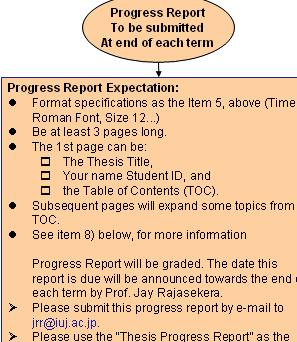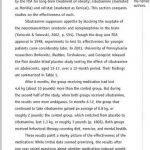How to write a successful Interim Report
In many Bachelor and Masters subjects students will commonly be required to complete an Interim Report. The University will review the Interim Report to gauge the student’s achievements to date and ensure that they are making adequate progress toward the final dissertation .
This assignment is comprised of a written report that summarises the student’s progress on their chosen project. Students will have already completed a Project Proposal and a Project Specification, which outline the intended research, practical procedures and outcomes. The dissertation Interim Report is essentially a process of reviewing and updating these documents, and noting any significant changes to your project. The Interim Report is very similar to the presentations required in ‘;upgrade panels’ for PhD students, except that at the Masters level students are not expected to show progress toward a full doctoral thesis.
The Interim Report is usually about 20 pages in length, and it is usually submitted in the Spring of your first year of study. The typical Interim Report structure includes the following items:
These may be the same as the documents that were submitted at the start of your degree programme. The Project Summary is a brief description of your proposed project, while the Project Specification provides a more detailed account about your intended methods and likely results. If any significant changes have been made to your project, these should be reflected in an updated Summary and Specification.
This may already be contained in the Project Specification Report, but if not then the Interim Report should include an up to date Table of Contents. In addition it is helpful to include 1-2 sentences that describe the content of each chapter.
The Interim Report is usually accompanied by a full literature review . which will form the basis of a dissertation chapter . Like all literature reviews, it should provide an overview of the theories and practices that are most relevant to your own work. It is often organised thematically and will demonstrate the student’s ability to contextualise their project within the recent advances in their field. This will probably be the longest section of the Interim Report.
This section of the Dissertation Interim Report will outline what you have achieved so far. It may include mentions of the background research you’ve undertaken, skills training you’ve received, and any practical work you’ve done toward completing your project.
In this part of the Interim Report students should note down any difficulties they’ve encountered so far. It should also contain some details of how the student plans to confront these challenges, whether through changes to the research plan or minor adjustments to the overall project. The University is particularly interested in this section of the Interim Report, as they want to ensure the student’s successful completion of the degree.

For most degree programmes students will also need to outline their research strategy for the remainder of the dissertation work. This may focus primarily on text-based research or it may require practical lab work. Regardless, the student should justify their chosen methodology and explain how it will adequately address the research question.
This section details the student’s plan of action for the remainder of the degree, and is usually broken down into a month-by-month timeline. You should include all the work that is relevant to completing the dissertation, including research, project development, chapter writing and lab activities. You might also include plans for additional skill training, funding bids, and conference presentations.
- Be Specific. Be very detailed in the information that you present. Avoid generalisations and vague statements of progress. Use examples to demonstrate your progress.
- Be Thorough. Be sure to mention all the work that you’ve done, even if some of it won’t be used in your final dissertation. This foundational research demonstrates your scholarly activity in the months before the Interim Report, and it also shows your ability to make discerning choices about your research project.
- Be Confident. The Interim Report provides you with a useful opportunity to present your progress and refine your future actions with the advice from supervisors and other faculty. However, try to avoid using a tone that makes you seem unsure of yourself or lacking confidence in your own progress. An assured and confident tone will help to convince examiners of your overall level of ability and accomplishments.
- Be Criticial. Your Interim Report should demonstrate your growth as a critical, engaged scholar. This requires you to show your ability to speak about your field in a highly knowledgeable way. Furthermore, you should be able to reflect critically on your own proposed project and how it can contribute to your field. This often includes acknowledging its weaknesses or shortcomings, and justifying why your approach is still a good one.
In many subject areas, Interim Reports are conducted through an oral presentation by the student. The Interim Report presentation is not marked separately, but it is taken into consideration when assessors review the written submission. In general, the marking criteria for the interim report are similar to those for the dissertation: assessors want to see error-free writing and grammar, clear structure, originality and critical thinking. Some of the mark will also be based on the quality of your progress to date – in other words, how good is the research that is described in the report?
The mark awarded for the Interim Report usually comprises a small percentage of the final dissertation module mark, typically 5% (with 90% of the mark coming from the dissertation itself and another 5% from the oral presentation of the dissertation). Marks will be awarded on the standard UK marking scale, as follows:
70 and above = First class (A)
60-69 = Second class, first division (B)
49-59 = Second class, second division (C)
40-48 = Third class (D)
References
Pat Cryer, 2006. The Research Student’s Guide to Success. 3 Edition. Open University Press.
University of Bolton. 2013. MSc Project Guidelines. [ONLINE] Available at: ami.ac.uk/students/msc_project/project_guidelines.asp. [Accessed 08 April 13].
University of Strathclyde. 2013. Interim Reports. [ONLINE] Available at: https://personal.cis.strath.ac.uk/ian.ruthven/research_students/interim.html. [Accessed 08 April 13].




 Faut-il craindre la mort dissertation proposal
Faut-il craindre la mort dissertation proposal Dissertation only distance phd english
Dissertation only distance phd english Phd dissertation defense presentation texas
Phd dissertation defense presentation texas Droits patrimoniaux et extrapatrimoniaux dissertation writing
Droits patrimoniaux et extrapatrimoniaux dissertation writing Best dissertation writers uk yahoo
Best dissertation writers uk yahoo






